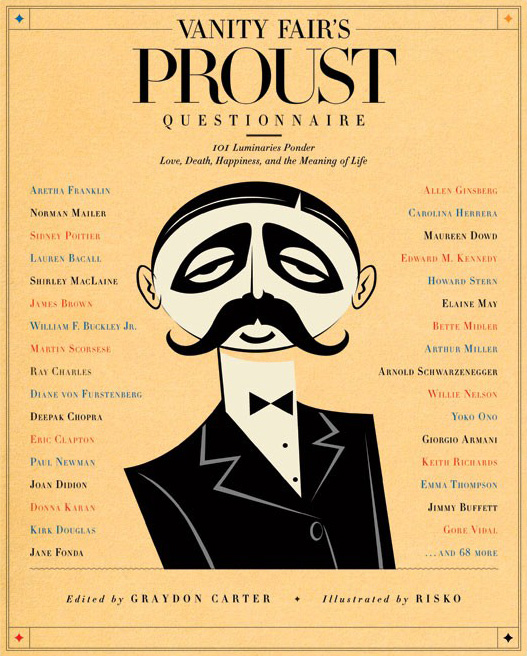Jane Goodall
Wikipedia
Jane Goodall Answers the Proust Questionnaire
by Maria Popova
A dead writer meets one of the greatest scientists alive.
 A century before today’s popular personality quizzes, Victorian “confession albums” served essentially the same role, presenting a series of simple questions designed to reveal the respondent’s sensibility and aspirations. In the 1880s, teenage Marcel Proust was given one such questionnaire by his friend Antoinette, the daughter of France’s then-president, which he promptly answered. The original manuscript, titled “by Marcel Proust himself,” lay dormant for decades, until it was discovered in 1924, two years after the writer’s death. Half a century later, French television host Bernard Pivot resurrected the questionnaire as a backbone for his literary interviews. In 1993, Vanity Fair transplanted the tradition to the last page of the magazine, which began featuring various public figures’ answers to the Proust Questionnaire.
A century before today’s popular personality quizzes, Victorian “confession albums” served essentially the same role, presenting a series of simple questions designed to reveal the respondent’s sensibility and aspirations. In the 1880s, teenage Marcel Proust was given one such questionnaire by his friend Antoinette, the daughter of France’s then-president, which he promptly answered. The original manuscript, titled “by Marcel Proust himself,” lay dormant for decades, until it was discovered in 1924, two years after the writer’s death. Half a century later, French television host Bernard Pivot resurrected the questionnaire as a backbone for his literary interviews. In 1993, Vanity Fair transplanted the tradition to the last page of the magazine, which began featuring various public figures’ answers to the Proust Questionnaire.
In 2009, the magazine released Vanity Fair’s Proust Questionnaire: 101 Luminaries Ponder Love, Death, Happiness, and the Meaning of Life (public library). Among the respondents is legendary primatologist and environmentalist Jane Goodall, she of great wisdom, who answered the famed survey in May of 2004.


What is your idea of perfect happiness? Sitting by myself in the forest in Gombe National Park watching one of the chimpanzee mothers with her family.What is your greatest fear?
That I shall be tortured and be a coward.What is the trait you most deplore in others?
Hypocrisy.What is your greatest extravagance?
Long-distance phone calls to my friends.What is your favorite journey?
My favorite ever journey was my first trip from Nairobi City to the Serengeti to Olduvai Gorge before it was famous, when there were no roads and all the animals were there. We were in an overloaded Land Rover, four people and two Dalmatians.What do you dislike most about your appearance?
Aging skin!What or who is the greatest love of your life?
My childhood companion and teacher — my dog, Rusty.When and where were you happiest?
In the early 60s, when I was alone at Gombe with the chimpanzees.What talent would you most like to have?
Ability to learn languages.What is your current state of mind?
Deep concern at the state of the planet, environmental and social.If you could change one thing about yourself, what would it be?
I need to be 20 years younger — there is too much to do.What do you consider your greatest achievement?
Starting our youth program, Roots & Shoots, along with helping to blur the line between humans and the rest of the animal kingdom.What do you regard as the lowest depth of misery?
Knowing you have let someone down, betrayed their trust.What is your favorite occupation?
Observing animals alone in the wilderness.What is your most marked characteristic?
Determination/optimism.What do you most value in your friends?
Being able to share happiness and sadness and have a good laugh.Who are your favorite writers?
Shakespeare, Tolkien, Mary Wesley.Who is your favorite hero of fiction?
Robin Hood.Who are your heroes in real life?
My mother, until her death; dedicated teachers; Kofi Annan; Nelson Mandela; Muhammad Yunus.What is it that you most dislike?
Receptions and dinners in noisy places with people talking too loud, riding in stretch limos, waste.How would you like to die?
Peacefully and before losing my physical and especially my mental facilities.What is your motto?
“As thy days, so shall thy strength be.”
That Goodall — one of the greatest scientists of the past century — should answer this last question with a quote from the fifth book of the Hebrew Bible and the Jewish Torah only speaks to her sensitivity to the spiritual aspect of science and her conviction that religion is useful only when and if it inspires us to do better.

Vanity Fair’s Proust Questionnaire features more responses by such cultural icons as Allen Ginsberg, Hedy Lamarr, Gore Vidal, Julia Child, and Joan Didion. Sample it further with David Bowie’s playful and poignant answers and complement it with LIFE magazine’s similarly-spirited 1991 volume The Meaning of Life.

No comments:
Post a Comment